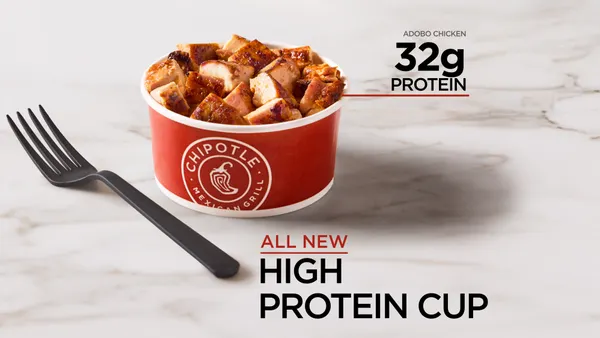Dive Brief:
- Fast food menu items contain significantly more calories and sodium than they did 30 years ago, according to a study published in the Journal of the Academy of Nutrition and Dietics, reported by Science Daily. Portion sizes have also increased according to the analysis, which examined food at 10 of the top U.S. fast food brands in 1986, 1991 and 2016.
- Lead investigator Megan A. McCrory, PhD, said that fast food is contributing to the "continuing problem of obesity and related, chronic conditions in the United States." A single QSR meal (containing an entrée and side) is roughly 767calories, or 40% of a 2,000-calorie diet.
- "We need to find better ways to help people consume fewer calories and sodium at fast-food restaurants," McCrory said in the article. "The requirement that chain restaurants display calories on their menus is a start. We would like to see more changes, such as restaurants offering smaller portions at proportional prices."
Dive Insight:
As long as consumer demand for convenience holds strong — and it shows no sign of waning — fast food will continue to be an integral component of American diets. And with the U.S. obesity epidemic worsening, many scientists are pointing to major QSR chains to improve the nutritional quality of their offerings.
But healthier fare can be difficult for chains to upsell, and these pricier items also come with food safety risks, as many are fresh or especially perishable, like salads and yogurt parfaits. Adding a few more nutritious meals to a menu may not be enough to encourage healthy eating behaviors. A survey from L.E.K. Consulting found that though 90% of participants aspired to eat healthier, 85% of the 1,600 respondents conceded to maintaining an unhealthy diet.
This could be due to calorie issues the 30-year fast food study points out. For example, Sweetgreen — a chain known for its fresh, better-for-you salad and grain bowls — offers salads that can hit up to 555 calories with 47 grams of fat per serving. A McDonald's Quarter Pounder contains roughly 530 calories, with 28 grams of fat and two times the amount of sodium.
To improve their image, many QSRs are partnering with outside consultants to improve the health of their menus. McDonald's, for example, collaborated with Alliance for a Healthier Generation in order to provide more fruits and vegetables in its menu. Still, a University of Connecticut Rudd Center for Food Policy and Obesity survey found that despite these efforts from major QSRs, fast food consumers' eating habits weren't positively impacted.
Of late, it seems the most popular way for chains to brighten their health halos is by adding plant-based foods to their offerings. According to HealthFocus data, 60% of consumers aged 15 to 70 are cutting back on meat-based products, and many diners associate plant-based foods with improved nutrition. White Castle's addition of the meat-free Impossible Burger to its chain reflects the growing power of this trend and the growth opportunities it offers. Some of the burger giant's locations sell roughly 300 Impossible Sliders daily. Since debuting the menu item, more than 60,000 customers have come together for a petition for McDonald's to jump on the plant-based wagon.
Even with the plant-based craze, it's important that restaurants are still transparent with the nutritional information, as they could be accused of "health washing" products that sound better for you, but may not be.








